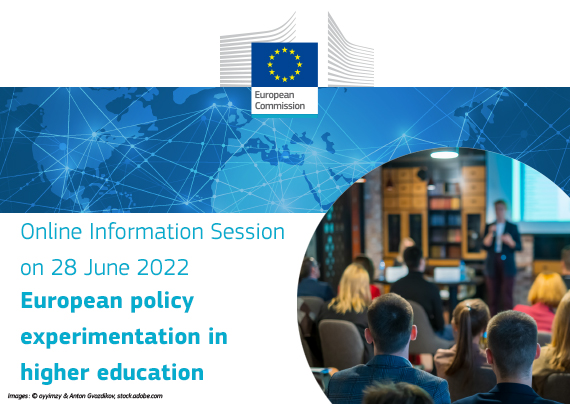
- This event has passed.
ONLINE INFO SESSION: EUROPEAN POLICY EXPERIMENTATION IN HIGHER EDUCATION UNDER THE ERASMUS+ PROGRAMME
June 28, 2022

The session will provide the potential applicants with the necessary policy background, specificities of the call for proposals and tips for preparing a successful application.
On Wednesday 15 June, the European Commission launched a European policy experimentation in higher education under the Erasmus+ programme, to pilot a joint European degree label and test institutionalised EU cooperation instruments, such as a possible European legal status for alliances. This to facilitate transnational cooperation of higher education institutions.
To support this European policy experimentation, a new Erasmus+ call for proposals has been launched with a total budget of EUR 2 000 000:
- EUR 1 000 000 to pilot a joint European degree label
- EUR 1 000 000 to pilot institutionalised EU cooperation instruments to explore the feasibility for a possible European legal status for alliances of higher education institutions
The objective of this call for proposals is to test and explore deeper transnational cooperation instruments to further develop a genuinely European dimension in the higher education sector, built on shared values, as mentioned in the European strategy for universities presented by the Commission on 18 January 2022 and as confirmed in the Council Conclusions on a European strategy empowering higher education institutions for the future of EuropeSearch for available translations of the preceding linkEN••• and the Council recommendation on building bridges for effective European higher education cooperationSearch for available translations of the preceding linkEN•••, adopted on 5 April 2022.
Structure of the Erasmus+ call
The Erasmus+ call is structured around two topics:
- Topic 1: Pilot a joint European degree label
This call will support the development and piloting of the implementation of European criteria for the award of a joint European degree label. The label would intend to recognise the value of innovative transnational learning experiences and to increase the visibility, attractiveness and reputation, both in Europe and beyond, of such joint programmes provided by alliances of European higher education institutions. Such a label would be issued as a complementary certificate to the qualifications obtained by students graduating from joint programmes delivered in the context of transnational cooperation between several higher education institutions. Based on the results of this preparatory work, the Commission will report to the Council on the way forward towards a possible joint degree based on co-created European criteria, building on the instruments of the Bologna Process. - Topic 2: Pilot institutionalised EU cooperation instruments to explore the feasibility for a possible European legal status for alliances of higher education institutions
This call will support the piloting of existing European instruments to facilitate deeper, long-term and flexible transnational cooperation among higher education institutions. The aim is to give alliances, on a voluntary basis, the latitude to act together, make common strategic decisions, experiment joint recruitment, design joint curricula or pool resources and human, technical, data, education, research and innovation capacities.
Background
This pilot call aims to deliver on the ambitious flagships set for effective European higher education cooperation in the Council conclusions on a European strategy empowering higher education institutions for the future of EuropeSearch for available translations of the preceding linkEN••• and in the Council Recommendation on building bridges for effective European higher education cooperationSearch for available translations of the preceding linkEN•••, adopted by the Council on 5 April 2022.
It builds on the European strategy for universities, presented by the European Commission on 18 January 2022.
Read more about the European strategy for universities.
How to apply
To get you started please refer to the EACEA guide: how to get a grantSearch for available translations of the preceding linkEN••• and Webinar session: The Funding & tenders Portal for beginners.
The Funding and Tender Opportunities Portal also has a useful online manual (business guide) and IT How To sectionSearch for available translations of the preceding linkIT••• (IT guide) to help you with the technical aspects of submitting a proposal online.
Find the call for proposals for European policy experimentation in higher education via the Funding and Tenders Portal.
The deadline for applications submission is 6 October (17.00 – Brussels time).
The call is open, competitive based on qualitative award criteria.
Information session for applicants
Organised by DG Education, Youth, Sport and Culture and the Education and Culture Executive Agency, an open information session for potential applicants will take place on 28 June2022(10.30 – 12.30) through webstreaming.
Connection details will be available closer to the date via this link.
You will also be able to watch the recording of the session through this link. All presentations will be available below.
- education grant
- –
Practical information
- When: –
- Languages : English
- Indicative agenda:10:30 – Start of the information session for applicantsWelcome and introduction Call for proposals: overall policy objectives and award criteria Call for proposals: important elements and specificities Tips for preparing an application Questions & Answers Closing remarks12:30 – End of the information sessionSource: European Commission I European Education and Culture Executive Agency (https://bit.ly/3tFwgg)